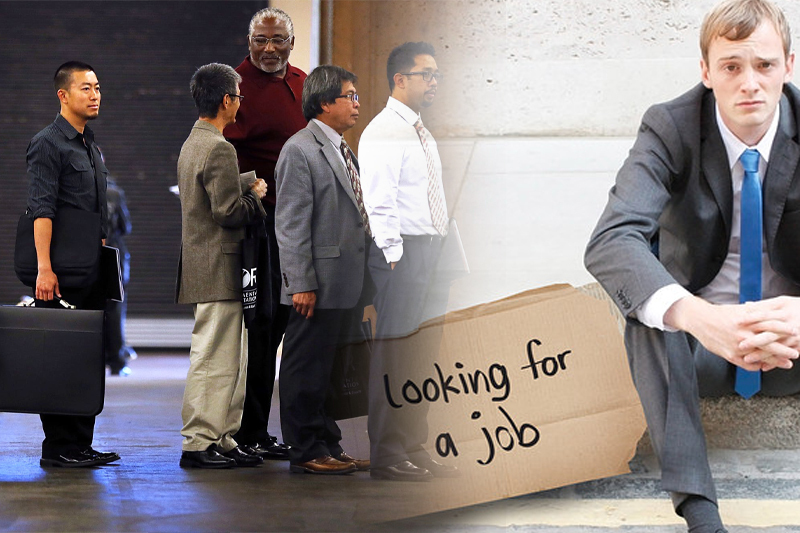The job market has become a tough environment for young Americans, making it difficult to start their careers. Despite the overall strength of the US economy, many are struggling to find work. This struggle, often referred to as ‘The Great Stay,’ reflects a slow hiring period that is especially affecting younger job seekers. Here’s a closer look at the situation.
Career Setbacks for Recent Graduates
Kirsten Staple, a 2022 graduate from the University of Texas at San Antonio with a degree in psychology, is just one of many young Americans feeling the effects of this challenging job market. Over the past two years, she has submitted more than 500 job applications, initially aiming for positions in her field. With no success, she broadened her search to include any full-time position, even at grocery stores, but remains unemployed and now lives with her parents in El Paso, Texas.
Her experience highlights the difficulties young job seekers are facing, even as the broader US economy appears strong. According to the Labor Department, the share of workers aged 20-24 in the overall workforce declined sharply in September 2024, and a survey from ZipRecruiter found that the percentage of young people aged 18-24 taking over a year to find a job has tripled.
The Long-Term Consequences of Career Delays
Economists warn that these early career setbacks can lead to significant lifetime losses in earnings and missed opportunities for skill development. This is particularly concerning since the first few years of a career are essential for gaining valuable experience and building professional networks.
Julia Pollak, chief economist at ZipRecruiter, explains that workers facing job market challenges early on often find themselves ‘scarred’ by the experience, leading to lower earnings and fewer job switches later in life. This has been observed with Millennials who graduated during the Great Recession and are still dealing with the effects years later.
‘The Great Stay’ Slows Down the Job Market
In 2022, job openings surged to record highs, and workers felt confident enough to quit and look for better opportunities. However, by 2024, the job market has significantly slowed down, partly due to the Federal Reserve’s interest rate hikes aimed at curbing inflation. While the US economy has avoided a recession, hiring has become sluggish.
Pollak refers to this period as ‘The Great Stay,’ where companies are slow to hire and fire, and job movement across the board is unusually low. In August 2024, the hiring rate fell to its lowest level since 2013, and fewer workers are quitting their jobs than at any point since 2015. This lack of movement is impacting young job seekers, who find it difficult to secure new roles.
Election Uncertainty and Employer Hesitation
The upcoming US presidential election is adding another layer of uncertainty to the job market. Employers are hesitant to expand hiring plans while waiting for clarity on interest rates and the broader economic outlook. This uncertainty has left job seekers like Jonathon Courtney, a recent graduate from the University of Houston with a master’s degree in applied economics, struggling to find work. Despite applying to over 200 jobs, he has only received five interviews.
Courtney’s frustration reflects a larger trend, as many young workers feel like “victims of circumstance” in this slow-moving job market.
Emotional and Financial Toll on Young Professionals
For those who have already started their careers, the risk of layoffs and prolonged job searches is adding to the emotional and financial strain. Catherine Dugoni, 26, lost her public relations job over a year ago and has yet to find a new one, despite sending out hundreds of job applications and participating in about 60 interviews. Dugoni’s situation forced her to move back in with her parents in Sacramento from San Francisco, as she could no longer afford rent.
The mental health toll of extended unemployment is severe. “It’s been defeating at times,” Dugoni said. Like many young job seekers, she finds herself navigating a tough economic landscape, with few opportunities in sight.
Conclusion: A Tough Road Ahead for Young Job Seekers
The struggles faced by young Americans like Staple, Courtney, and Dugoni highlight the long-term challenges that may shape their professional futures. While the US economy remains in decent shape overall, ‘The Great Stay’ is making it difficult for young people to gain a foothold in their careers. Early career setbacks could lead to lasting consequences, including lower lifetime earnings and fewer opportunities for growth, leaving many feeling stuck in an unpredictable job market.

